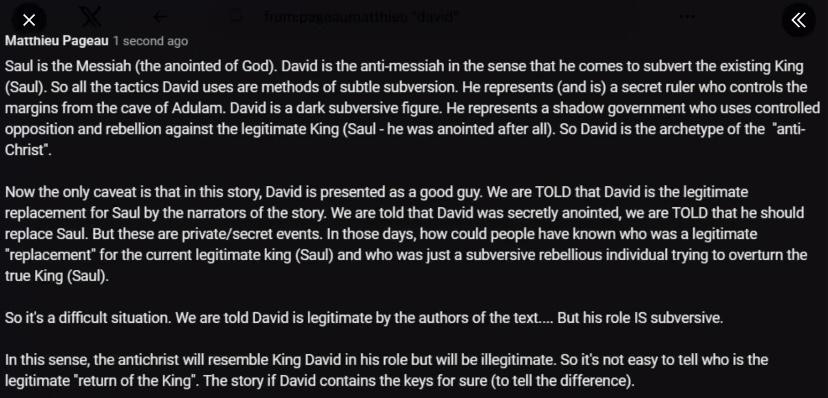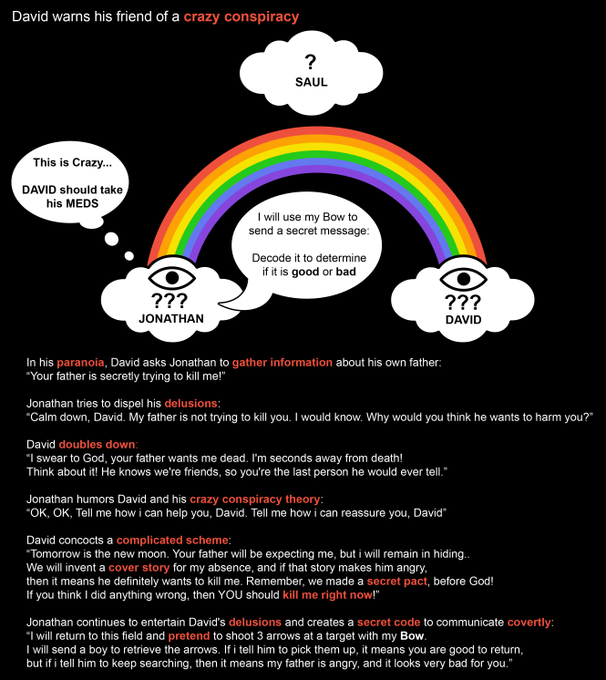David
- A Return of the King story (King Arthur, from mixed identity origin and a nobody, hidden)
Matthieu’s Tweets
- “Loving your enemy” involves entering the cycle in order to “pass through it”. At first it brings you into more cyclical influences but eventually it cancels the cycle. The story of David is largely about this “passage into the cycle” to finally escape it completely - MP
- “David is a male embodiment of this power which was needed to replace Saul in a gradual and natural way, without causing a flood” - MP
- “He said he was King while the real king was still there: Saul. For anyone listening to him who was not privy to his anointing, he had delusions of grandeur” - MP
- (we would expect God to intervene supernaturally to immediately depose Saul, but it does not happen this way, see below)
- David does not seize the fruit (of Tree of the Knowledge of Good and Bad (TKGB) 🎄) prematurely
- “David’s weapon is almost always the cycle. Even when he uses the sword against the giant, he is using the sword of his enemy against him. (using your weapon against you = cycle)” - MP
- “David literally uses controlled opposition when he sends a false councilor (Hushai) to his son in oder for his son to follow BAD advice. But David himself is God’s controlled opposition. Saul WAS annoyed by God. Never forget that.” - MP
- “Sounding crazy =/= going crazy. David knows the difference.” - MP
- But this is symbolism few understand. It’s a fringe meaning of the rainbow in the Bible (as a weapon). But it’s there. Maybe some day i will talk about it. It’s related to why David’s weapon is a sling. He uses the “full cycle” as weapon while Joseph and Jonathan use the “bow” - MP
- I don’t need scholars to tell me David is Machiavellian. It’s all over the story. It’s basically everything he does. He represents the “good stumbling stone” who renews the King. So he often looks like the “bad stumbling stone” but with subtle differences.
- The goal of the author seems to be to help us differentiate between David’s good and David’s bad. But it’s not easy because even his bad moves often end up being rewarded (after repentance and punishment). Like Solomon out of Bathsheba.
- David is a fool, don’t you know? Exactly the the right kind of fool (the kind that does not destroy himself in the process of renewal). A rare breed.
- Solomon had a phase (in tradition) where he “went crazy and became a fool”, like the moon as it goes full dark (David/Solomon are associated with the moon). ⇒ Ecclesiastes. This could be seen as an exaggeration that happened because he lacked that attribute in a proper way.
- Joseph is the one who solves the problem of Shechem (which is the equivalent of TKGB in Canaan). Joshua (of Joseph) negates Mount Ebal (the “bad” side of the tree) with the curse on Ebal. But this is actually a temporary solution. David is the one who finally redeems the “bad”.

Biography
- Tribe of Judah (the tribe of the Messiah)
- Bethlehem
- Youngest of 8 (resurrection, remainder) brothers
- Son of Jesse (a shepherd)
- Privately anointed (resurrection), public sacrifice (crucifixion)?
- Red, ruddy (Esau); usage of red in iconography
- Anointed by Samuel (olive oil)
- Bear and Lion fighter (like Adam, like God and the garments?)
- Sent to Jerusalem on donkey with bread and wine
- Musician - Harp (plays music to exorcise Saul’s demons)
- “One of Jesse’s sons from Bethlehem is a talented harp player. Not only that—he is a brave warrior, a man of war, and has good judgment. He is also a fine-looking young man (contrast with Jesus, and the Lord is with him”
- Saul’s armor bearer (“Saul loved David very much”)
- Giant slayer
- United to Saul’s body:
- via brotherly relationship with Jonathan
- via marriage to Saul’s daughter Micah (originally promised Merab
Moon 🌖
- David is to the Moon 🌖 (as Samson is the Sun 🌅 )
- moon is in darkness
- more difficult to chart its course
- related to water, sea, tides (thus related to time)
- monthly cycle (feminine pattern) vs. annular (sun, masculine)
- being connected with the body of stars? stars are the same, but the Mother of God is the leader of stars (by being the brightest at night); the sun is the leader (Christ)
- “Some say David was ALMOST a werewolf. Solomon too. They went a little crazy on the moon cycles. But not completely. ;)” - MP
Goliath
- Giant; ref to Nimrod
- “Pagan” Philistine (specifically Gath)
- Goliath wears bronze armor (lowest metal, a man of the earth, a lot of “body”); symbol of Antediluvian Knowledge (per Lord of Spirits)
- Goliath taunts Israel; Saul offers a reward; David seizes the reward
- David refuses Saul’s armor (copper helmet); treating Saul like a foreigner; doesn’t want to be clothed by the king
- David selected “five smooth stones from a stream” and uses a sling:
- as a “little guy” you cannot challenge the greater power on their terms using their own weapons
- smooth stone represents the “seed” or “stumbling stone” (or see Daniel for the Messianic stone which strikes the foot of Neb’s statue and grows into an everlasting empire)
- David decapitates Goliath with his own sword (see Haman, and being killed by your own devices)
- Saul does not recognize David (“whose son is this?!”), even tho David has been his armor bearer, and his comforter with the harp, and lived in his court. Is this Saul’s forgetfulness or inattention to detail, or is this David’s ability to “fly under the radar”?

Saul
- Saul’s jealousy: “Saul has killed his thousands, and David his ten thousands!”
- Saul attempts to “pin” David with a spear (like one pins an insect to control and study and name it); totalitarianism
Michal
“Then Michal took an idol and put it in his bed, covered it with blankets, and put a cushion of goat’s hair at its head”
(1 Sam 19:11-17)
Samuel
So David escaped and went to Ramah to see Samuel, and he told him all that Saul had done to him. Then Samuel took David with him to live at Naioth. When the report reached Saul that David was at Naioth in Ramah, he sent troops to capture him. But when they arrived and saw Samuel leading a group of prophets who were prophesying, the Spirit of God came upon Saul’s men, and they also began to prophesy. When Saul heard what had happened, he sent other troops, but they, too, prophesied! The same thing happened a third time. Finally, Saul himself went to Ramah and arrived at the great well in Secu. “Where are Samuel and David?” he demanded. “They are at Naioth in Ramah,” someone told him. But on the way to Naioth in Ramah the Spirit of God came even upon Saul, and he, too, began to prophesy all the way to Naioth! He tore off his clothes and lay naked on the ground all day and all night, prophesying in the presence of Samuel. The people who were watching exclaimed, “What? Is even Saul a prophet?”
(1 Sam 19:18-24)
Jonathan
- Clothed David as a kind of prince
- Willing offers his place to David:
- “‘You stupid son of a whore!’ he swore at him. ‘Do you think I don’t know that you want him to be king in your place, shaming yourself and your mother? As long as that son of Jesse is alive, you’ll never be king. Now go and get him so I can kill him!’”

(1 Sam 20:1-42)